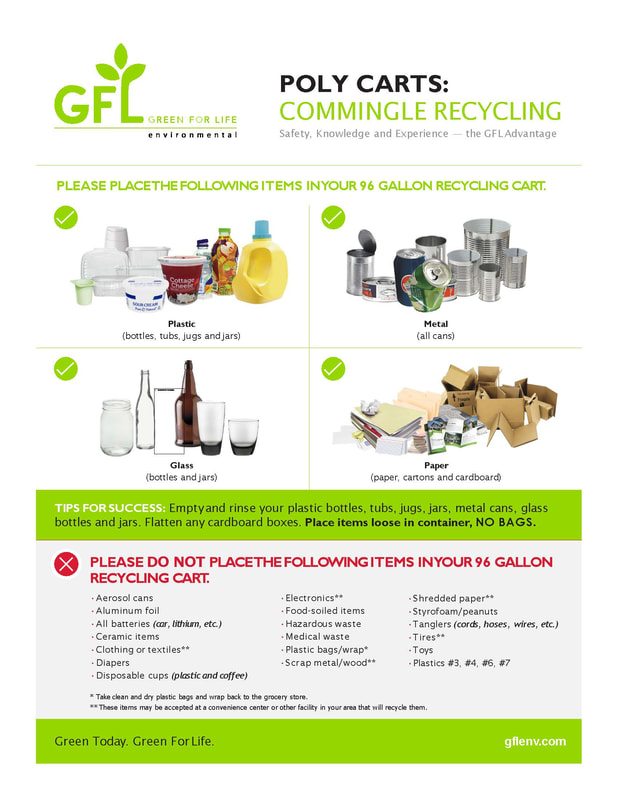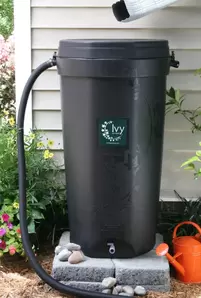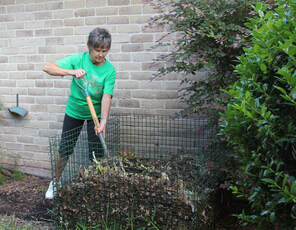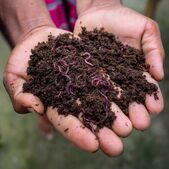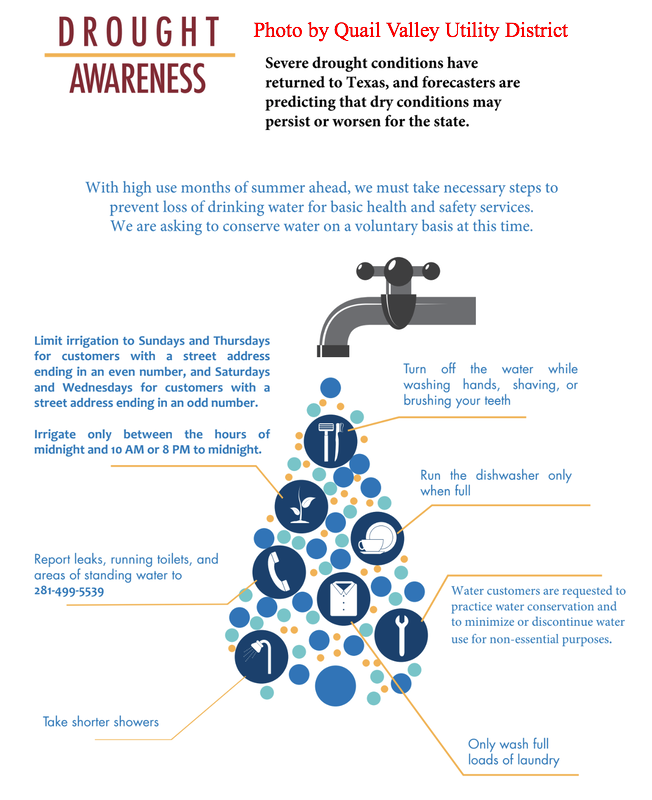Make a Commitment to Go Green in 2024!
Create a more environmentally friendly household and to live in a more Earth-conscious way. Make small, manageable changes that will add up over time. Click here for more information.
Learn More:
Recycling is as easy as 1, 2, 3!
|
Recycling is as easy as 1,2,3 - just keep it clean! Remember - when in doubt, leave it out! Do's: 1. Recycle cans (cylinder shape including tubs and containers) 2. Recycle clean bottles (wider at the bottom, narrow on top like a detergent bottle or milk jug) 3. Recycle clean paper/ cardboard Don'ts: 1. Never place food or liquid in the recycle bin 2. Never place plastic bags or plastic wrap in the recycle bin 3. Never place styrofoam products in the recycle bin For Missouri City residents -Every other week; GFL will collect plastics, all metal cans, all cardboard, glass and paper or paper cartons. Please rinse your containers and flatten cardboard boxes. Recyclable materials do NOT include pizza boxes; this may be disposed of in the blue solid waste container. Please click here to download “Commingle Recycling” guide. |
The Fort Bend County Recycle Center provides a regional center for general and HHW recycling for Fort Bend County residents. They are committed to protecting the environment by promoting recycling, reducing and reusing in order to ensure a safe and healthy community for current and future generations by keeping items out of landfills.
Click here for a list of acceptable items.
Click here for a list of acceptable items.
Recycling Activity Book for Children Late Elementary This 16-page book, designed for students in fourth and fifth grade, provides fun and educational recycling-oriented puzzles and activities, including word search games, mazes, math mashups, and secret code deciphering. Answer pages are included.
Recycling Activity Book for Children Early ElementaryThis 16-page book, designed for students in second and third grade, provides fun and educational recycling-oriented puzzles and activities, including word search games, mazes, connect the dots, and coloring pages. Answer pages are included.
Household Hazardous WasteRead the latest Household Hazardous Waste brochure full of information about Household Hazardous Waste diposal and reduction tips:
Get the Power Over Household Chemicals Household Hazardous Waste Collection The Fort Bend County Recycling/Household Hazardous Waste Center - 1200 Blume Road Rosenberg, TX 77471 (281-633-7581) The recycling center accepts specific household hazardous waster for a fee from Fort Bend County residents with proof of residency. Items that are accepted at the facility. |
Recycling In The Community
|
Plastic Bag Recycling:
|
|
Cell Phones
General drop-off locations for cell phones include:
General drop-off locations for cell phones include:
- City Hall Lobby (1522 Texas Parkway)
- Municipal Court Lobby (3845 Cartwright Road)
- Police Station Lobby (3849 Cartwright Road)
- Parks Maintenance Facility (1523 Texas Parkway)
|
Prescription Drugs
Unwanted, unused and expired drug medication can be safely disposed of at: Missouri City's Public Safety Headquarters 3849 Cartwright Road, Missouri City TX 77459. Electronics
Best Buy - Will accept electronics and appliances, with a few exceptions, and will take them at no charge, no matter what retailer they were purchased from.
Click here for further information on what they accept and any associated costs. CompuCycle - 8019 Kempwood Dr, Houston 77055 Click here for more information The Fort Bend County Recycle Center - Click here for further information on what they accept and any associated costs
|
Need help recycling a specific item- visit Earth 911
Additional Tips on What and How to Recycle: Plastics, Bottles, Cardboard and More! Click here!
Textile Recycling- Donate First, Recycle Second
|
Textile Recycling targets textiles going into landfills, not items being donated to charities, churches, non-profits and other organizations. We encourage residents to donate items in good condition to a local charitable organizations.
What textiles can be recycled?
|
|
Green City Recycler is a textile recycling company that diverts used clothing, shoes, and other household items from the landfill. They accept items that are not in good enough condition to donate to local thrift shops.
De-cluttering? Schedule a FREE pickup by visiting greencityrecycler.com
Call Green City Recycler at 832.989.2745
De-cluttering? Schedule a FREE pickup by visiting greencityrecycler.com
Call Green City Recycler at 832.989.2745
Check out this article on Selling, Donating and Recycling Old Clothing! MCG would like to thank Sara, a member of the Stem Club in Lyndhurst, NJ who sent this to us.
Missouri City Parks and Recreation Tree Programs
Memorial Tree and Bench Program - For a donation of $100, the city's Memorial Tree Program will plant a 6 to 10 foot tall tree in memory of a friend or loved one. Donate a park bench for a friend or loved-one in one of Missouri City Parks.
Missouri City Tree Challenge - Nichols Family of Quail Valley, has generously offered to match their neighbor’s tree donations, for up to 50 trees at Missouri City Parks. Starting in the 2014 planting season, trees will be planted at five city parks. Trees will average 6’-12’ tall at the time of planting. The City Forester will select the appropriate species and location for each tree sponsored.
Three for Trees - Quail Valley Golf Course will donate $10 to tree care and plantings with purchase of golf packages.
Tree Care - Practical, affordable and effective ways to add trees to your home. Click here.
Missouri City Tree Challenge - Nichols Family of Quail Valley, has generously offered to match their neighbor’s tree donations, for up to 50 trees at Missouri City Parks. Starting in the 2014 planting season, trees will be planted at five city parks. Trees will average 6’-12’ tall at the time of planting. The City Forester will select the appropriate species and location for each tree sponsored.
Three for Trees - Quail Valley Golf Course will donate $10 to tree care and plantings with purchase of golf packages.
Tree Care - Practical, affordable and effective ways to add trees to your home. Click here.
Rainwater Harvesting
|
In Texas, over 30% of the water we use goes to outdoor irrigation. When we use rainwater to water our landscape, gardens and container plants, we conserve our drinking water and save money on our water bill. Rainwater is not only free, it's salt-free and a good source of water for all of our plants. The easiest way to begin harvesting rainwater for your home is to collect rainwater from your roof and store it in rain barrels. To learn more about rainwater harvesting click on the following publications: Rainwater Harvesting with Rain Barrels, Rainwater Harvesting “Saving from a Rainy Day". Click on the following to learn about covering your rain barrel with wood slats or paint. |
Don't bag your waste - Compost it!
|
Composting is nature’s way of recycling. It is one of the most powerful actions we can take to reduce our trash, address climate change, and build healthy soil. By turning our food scraps and yard trimmings into compost, we transform our waste streams into a beneficial, value-added soil amendment. There are different ways to compost at home:
|
Backyard Composting: Check out these guides from Texas A&M Agrilife Extension on Composting. Click here and here
|
Composting with worms is often called an "organic garbage disposal system". Worms can efficiently recycle vegetable peelings and paper products through their bodies to produce a rich, earth-smelling soil conditioner that plants love. To learn more about composting with worms click on the following publications: |
Conserving Water at Home- What you can do!
Conserving water in your home is easy. Most homes use a large amount of water in each of the four areas: the bathrooms, the kitchen, the laundry room and the outdoors. Making a few small changes can have a big impact on the amount of water used during a drought and the amount of money left in your pocket after paying your water bill.
Below tips are provided by the Bravos River Authority.
Tips for the bathroom:
Tips for the kitchen:
Tips for the laundry room:
Tips for outdoor use:
Tips for the bathroom:
- Replace showerheads with a more efficient low flow model. A new showerhead can save up to six gallons of water per minute.
- Place a plastic bag or bottle filled with water in your toilet tank to reduce the amount of water per fill.
- If you have a leak, fix it! Replace worn washers and valves on sinks and pipes. A leaking faucet can waste more than 3,820 gallons of water a year.
- Take showers instead of baths.
- Fill the sink with water instead of running it continuously while brushing your teeth or shaving.
Tips for the kitchen:
- Run the dishwasher only when fully loaded.
- Install faucet aerators, they cut the water use from the sink in half.
- When cooking, steam your vegetables instead of boiling them in a full pot of water. It's healthier and uses less water.
- Don't leave the water running while doing dishes; fill the sink with soapy water and rinse as needed.
Tips for the laundry room:
- Wash only full loads.
- Upgrade to a high efficiency washer. Most newer models use up to 40 percent less water and energy than a conventional washer.
Tips for outdoor use:
- Do not over-water your lawn. Set sprinklers for times when it is the coolest to avoid evaporation.
- Cover pools and spas to help against evaporation in the summer.
- Choose your plants wisely! Buy plants that are native and can take the heat waves. Click here for more information on xeriscaping.
- Don't cut your lawn too short. Longer grass absorbs water better than short grass.
- Use lots of mulch in your flower beds and around trees to help hold in moisture.
- If you wash your car at home, use a bucket of soapy water and a nozzle on the hose that you can turn on and off.

